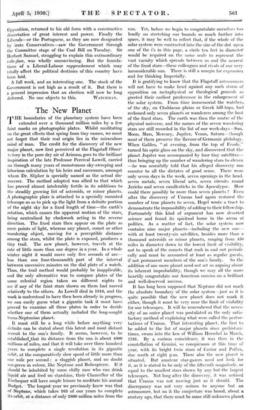The Week in Parliament S IR HILTON YOUNG raised the vexed
question of Imperial wireless communications on Wednesday of last week. As was to be expected, he put the case against the Government decision not to use the beam service of the • Communications Company with great clarity and vigour ; and the Postmaster-General in reply defended his Department with considerable dialectical skill and, towards the conclusion of his speech, with unwonted fervour. The facts in dispute were far too technical for a House of Commons debate, but to a layman it seemed that Mr. Lees-Smith was beaten on merits by a short head. Thursday witnessed a debate on cotton. The best speech came from Sir Herbert Samuel, who rightly protested against the interminable delay in publishing the report of the comp mittee of enquiry set up by the Government. He pointed out that three-quarters of the cotton goods sold out of Japan, our chief competitor, were handled by three firms, and that four firms accounted for 40 per cent. of the total cotton production in that country.
The figures for Lancashire made the House gasp. There are 1,800 separate spinning and weaving firms and nearly 800 exporting merchants. Sir Herbert observed that while the first industrial revolution sub- stituted machine labour for hand labour, the second industrial revolution, now proceeding, substitutes -vast. scale production for small-scale production, and is of even greater importance. This is true. B it the tragic feature of the present situation is that, whereas in the first revolution we led the way, to-day we are ten years behind our most formidable rivals in industrial organization.
Sir Nairne Stewart Sandeman, who should be heard more often, made a contribution to the debate of eon• siderable practical value. Mr. Graham, winding up, held out little hope for the immediate future, but contemplated the ultimate development of this industry, as of others, into something analogous to a public corporation, a favourite theme of his and one upon which he is always interesting.
Sugar followed. And here the Government, through the mouth of Dr. Shiels, rejected the recommendations of Lord Olivier, and then confessed themselves absolutely impotent. For this the Treasury bench received a severe basting from Major Elliot, and well deserved it.
Friday disclosed Miss Bondfield, in a white sheet of repentance, asking for the increased borrowing powers for the Unemployment Fund which she had previously roundly condemned as dishonest, and which she admitted she still- regarded as a " detestable " course to adopt. Mr. W. S. Morrison started a good speech, but was somewhat thrown out of his stride by the interruption of Black Rod. And Mr. Churchill, winding up for the Opposition, returned to his old form with a constructive dissertation of great interest and power. Finally the Liberals—or the Portuguese, as they are now designated by irate Conservatives—saw the Government through the Committee stage of the Coal Bill on Tuesday. Sir Herbert Samuel, struggling to explain this extraordinary volte-face, was wholly unconvincing. But the founda- tions of a Liberal-Labour rapprochement which may vitally affect the political destinies of this country have been laid.
A full week, and an interesting one. T-he stock of the Government is not high as -a result of it. But there is a general impression that- an election will now be long deferred. No one objects to this. WATCHMAN.











































 Previous page
Previous page